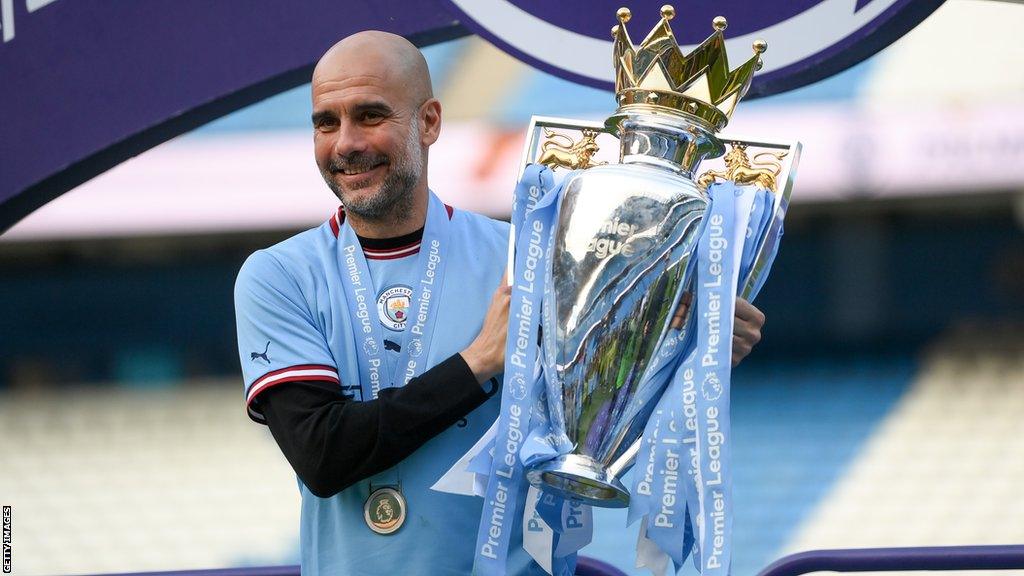Premier League winter break: When is it? What are the fixtures? Why was it brought in?
- Published

Premier League champions Manchester City are set to have 14 days between matches
The Premier League winter break - or mid-season player break as the league likes to call it - returns this season.
The only previous break came in 2020 with the Covid-19 pandemic and last year's winter World Cup in Qatar putting paid to it since.
Here's how it works.
When is the Premier League winter break?
Rather than the league stopping completely - like we see in Spain, Germany and France for example - the break is split over two weekends.
That means matchweek 21 is over two weekends, with five games in each. It means 10 teams play one weekend, and get the following off, with the other 10 taking a weekend off before playing.
Half of the games are across 12-14 January, with the other five taking place across 20-22 January.
In 2020, the break took place across matchweek 26 so it is happening considerably earlier this season, and much closer to the hectic Christmas period, where the schedule is more condensed.
What are the fixtures during the winter break?
On both weekends, the five matches are split across three days for TV broadcast purposes. Here are the fixtures (all times are GMT and subject to change):
Friday, 12 January
Burnley v Luton Town (19:45)
Saturday, 13 January
Chelsea v Fulham (12:30)
Newcastle United v Manchester City (17:30)
Sunday, 14 January
Everton v Aston Villa (14:00)
Manchester United v Tottenham Hotspur (16:30)
Saturday, 20 January
Arsenal v Crystal Palace (12:30)
Brentford v Nottingham Forest (17:30)
Sunday, 21 January
Sheffield United v West Ham United (14:00)
Bournemouth v Liverpool (16:30)
Monday, 22 January
Brighton & Hove Albion v Wolverhampton Wanderers (19:45)
The Carabao Cup semi-finals will be played around the break, but any side needing a replay in the FA Cup third round has their break reduced as a result of the extra game.
Which sides will benefit the most?
Seven Premier League sides - Crystal Palace, Everton, Brentford, Wolves, Luton Town, Nottingham Forest and West Ham - face a replay in the FA Cup third round.
Wolves were set to benefit most with a 17-day break, but has been reduced to 11 days as a result of the extra game.
The three Premier League teams in the EFL Cup last four - Chelsea, Fulham and Liverpool - already had reduced breaks. They have 10-, 11- and 11-day breaks respectively.
It is difficult to work out exact breaks at this stage because some sides return to action with their FA Cup fourth-round tie, which dates are yet to be confirmed for.
Working on the basis that teams play on Saturday, 27 January if they have an FA Cup fourth-round tie, then Burnley benefit the most from the winter break. Vincent Kompany's side are set to have 19 days between matches. Their last game before the break, in the Premier League against Luton, has been brought forward three days because the Hatters now have an FA Cup replay at Bolton. Their first game after the break, because they are out of the FA Cup themselves, is at Manchester City on 31 January.
Brighton are set to have 16 days off, with Bournemouth and Sheffield United having 15. Manchester City and Newcastle have 14 days off currently, with five sides - including Arsenal and Tottenham - having 13.
Nottingham Forest's break is 10 days with their FA Cup replay taking place on Wednesday, 17 January. They would also have another 10 days off if they fail to progress.
Everton may have two 10-day gaps - one between their original FA Cup tie and Premier League game on 14 January and then another from their replay with Palace and a potential fourth-round tie.
Why was it brought in and what was the reaction?
The first break was agreed in June 2018 by the Football Association, Premier League and English Football League.
The FA described it as "a significant moment", saying it would "greatly benefit club and country" before the European Championship that summer. It is the same this summer.
Players were given a break from training last time before a number of top-flight clubs opted to travel overseas for warm weather training.
The reaction was largely positive, but then Tottenham boss Jose Mourinho said he "doesn't care about the break" because he wanted it to be closer to their Champions League last-16 tie against RB Leipzig.
Liverpool boss Jurgen Klopp was annoyed at FA Cup replays shortening the break last time, opting to rule first-team players and himself out of their tie against Shrewsbury, saying: "If we react how we always react and find a way to do it, then nothing will change."
After his side beat Arsenal on Sunday and avoided a replay, the German called it "the biggest bonus ever", while Brentford boss Thomas Frank, who saw his side draw with Wolves, said: "It's the worst outcome in every aspect."
Crystal Palace boss Roy Hodgson called the replay "the last thing either of us wanted in a way" after his side drew 0-0 with Everton.
BBC Sport app: Download to follow all the latest on your Premier League team

Our coverage of your Premier League club is bigger and better than ever before - follow your team and sign up for notifications in the BBC Sport app to make sure you never miss a moment
